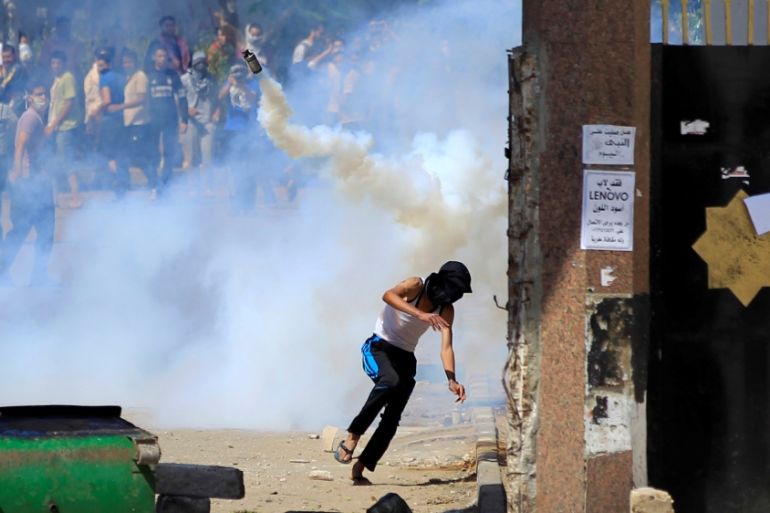Egypt sentences police officers over detainee’s death
Beating to death of 45-year-old man under police custody sparked riots in the city of Luxor in November.

An Egyptian court has sentenced six policemen to up to seven years in prison over the death of a detainee in the southern city of Luxor.
|
|
The Qena Criminal Court convicted policeman Samir Imam, 24, on Tuesday and sentenced him to seven years for beating the detainee to death.
Keep reading
list of 4 itemsPalestinian Prisoner’s Day: How many are still in Israeli detention?
‘Mama we’re dying’: Only able to hear her kids in Gaza in their final days
Europe pledges to boost aid to Sudan on unwelcome war anniversary
Another five officers were sentenced to three years.
The court also ordered the Interior Ministry to pay 1.5 million Egyptian pounds ($170,000) to the man’s family.
Seven policemen were acquitted. The policemen can appeal against the verdict.
The death of 45-year-old Talaat Shabeeb al-Rashidi in police custody in November sparked riots in Luxor. His family accused police of beating him to death, saying that they saw bruises on his body.
Rights groups say torture is widespread in Egyptian detention facilities.
They allege a culture of impunity in which police are rarely held to account over accusations of torture of suspects and have called for an independent body to investigate.
But authorities say abuses are rare.
The interior ministry has said that it would investigate all abuse allegations.
Police brutality
Public anger over allegations of police brutality has been bubbling over the past months, with several incidents spilling over into skirmishes and protests, five years after the ministry’s officers were a major focus of a 2011 uprising.
An end to police brutality was one of the key demands of the uprising which ended Hosni Mubarak’s 30-year rule.
Unlike in the past, the families of those who have died in custody have been vocal in their demands for transparent investigations.
Prosecutors had ordered the trial in December after a coroner’s report found Shabeeb had received blows to the back and neck that had broken his vertebrae and severed his spine.
READ MORE: Irish citizen on hunger strike turns 20 in Egypt prison
Rashidi was picked up by police at a cafe in Luxor and was dead within hours.
Police accused him of dealing in drugs. His family denied that and a cousin said they had been seeking redress days after Rashidi was involved in a public spat with a policeman.
They said Rashidi, in his 40s, worked in a tourist bazaar but had fallen on hard times as the 2011 uprising had hit tourism.
A riot erupted in a Cairo suburb in April when a policeman shot three people after an argument over the price of a cup of tea, killing one of them.
In February, a policeman shot dead a driver in the street in an argument over a fare, prompting hundreds to protest outside the Cairo security directorate.
Also, according to reports, more than 1,000 supporters of former President Mohamed Morsi have been killed in clashes with police since President Abdel Fattah el-Sisi overthrew him in July 2013. More than 600 of them were killed in a single day when police dispersed a Cairo protest camp.
|
|